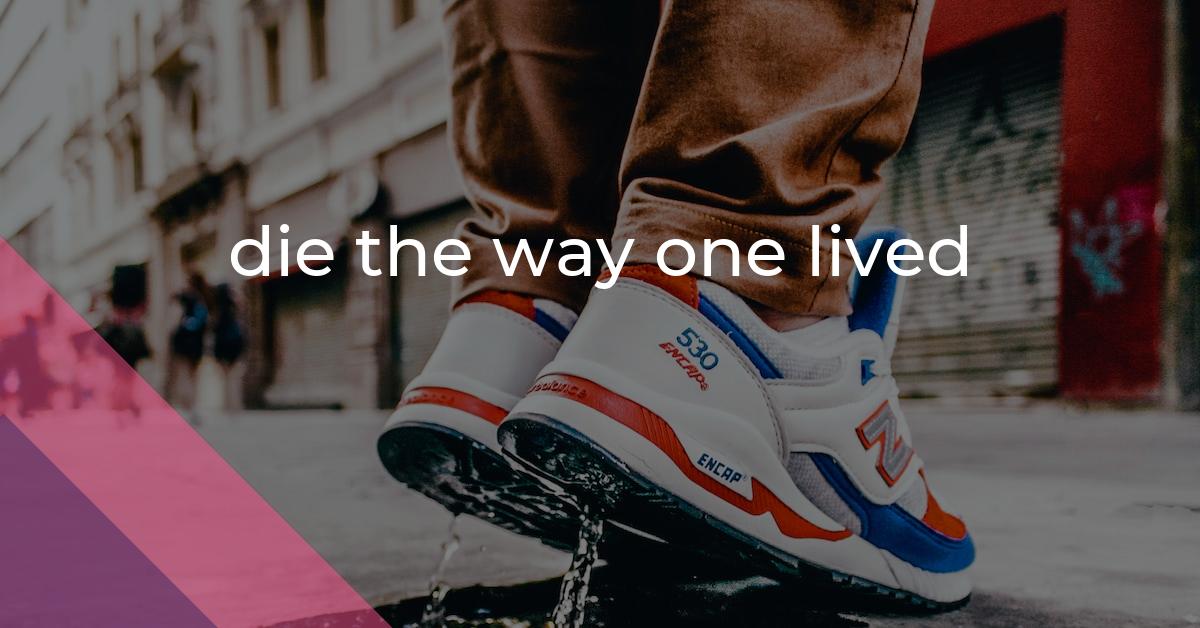die the way one lived: Idiom Meaning and Origin
What does ‘die the way one lived’ mean?
The idiom "die the way one lived" means that a person's death reflects their lifestyle, actions, or choices during their lifetime.

Idiom Explorer
The idiom "live and die by" means to strongly adhere to a particular principle or belief, often with unwavering commitment and devotion, even in the face of challenges or consequences. It conveys the idea of being entirely reliant on or judged by that principle or belief.
The idiom "eat one's gun" is an extreme figurative expression that refers to the act of committing suicide by shooting oneself with a gun. It signifies utter desperation or hopelessness in a person's life.
The idiom "eat, breathe, and sleep" means to be completely consumed or obsessed with something, to the point where it becomes an essential and constant part of one's life.
The idiom "dying breed" refers to a group or type of people or things that are becoming rare or disappearing completely. It implies that there are few remaining members or examples of that particular group or type.
The idiom "draw one's last breath" means to die or to take one's final breath before passing away.
The idiom "do-or-die" means that a situation requires full commitment and determination. It suggests that failure is not an option and that one must give their utmost effort to succeed.
The idiom "die out" means to cease to exist or become extinct. It is often used to describe the decline or disappearance of a species, a language, or a cultural tradition.
The idiom "die on the vine" means to fail or end without achieving success or completion. It is often used to describe a project, plan, or idea that does not progress or develops further.
The idiom "die on one's arse" means to fail miserably or to have a plan or endeavor go completely wrong, resulting in no success or progress.
The idiom "die down" means to gradually become less intense, loud, or active.
The Lasting Imprint: Vivid Exit
The idiom "die the way one lived" reflects the belief that a person's actions and choices in life are inherently connected to their ultimate fate. It suggests that the manner in which a person lives will shape the circumstances of their death, and that their death will be a reflection of who they were as a person.
This idiom can be interpreted in different ways depending on the context. It can refer to both the positive and negative aspects of a person's life. For example, if someone is known for living a life full of adventure and taking risks, they may also meet a dramatic or unexpected end. In this case, they could be said to "live and die by" their adventurous spirit.
This idiom is closely related to the concept of karma. Karma suggests that a person's actions in life will have consequences that carry over into their death and future lives. It reflects the belief that there is a natural order and balance to the universe, and that a person's fate is determined by their own choices and actions. Therefore, if a person lives a life filled with kindness and generosity, their death may be marked by acts of goodwill or selflessness, as they "die the way they lived."
Furthermore, the idiom is a reflection of societal values and expectations. It implies that a person's death should be consistent with the image they projected throughout their life. In other words, a person's legacy is not only shaped by their achievements and contributions, but also by their character and moral compass. When someone "dies the way they lived," it means that their death is in line with the values and principles they held dear.
Additionally, this idiom serves as a reminder to live authentically and intentionally. It warns against hypocrisy or inconsistency, as it suggests that one's true nature will inevitably be revealed in the end. It encourages individuals to align their actions and choices with their values and to live a life of authenticity and purpose. By doing so, they can ensure that they "die the way they lived," with integrity and a sense of fulfillment.
The idiom "die the way one lived" encapsulates the idea that a person's actions and choices in life are intrinsically linked to their ultimate fate. It suggests that how a person lives their life will shape the circumstances of their death and reflects both the positive and negative aspects of their character. Furthermore, it embodies the concept of karma and serves as a reminder to live a life of authenticity and intentionality. While the idiom may be influenced by societal values and expectations, it also acknowledges the complexity and uniqueness of human existence, leaving room for interpretation and contemplation.
Example usage
Examples of how the idiom "die the way one lived" can be used in a sentence:
1. He was an adventurous soul who loved to travel, so it's no surprise that he died the way he lived - exploring new places and seeking new adventures.
2. She had always been a kind and compassionate person, and in her final moments, she died the way she lived - surrounded by loved ones and doing whatever she could to make them feel loved and cared for.
3. As a passionate artist, he dedicated his life to his craft. Even in his final days, he continued to paint and create, dying the way he lived - immersed in his art and expressing his creativity until the very end.
More "Legacy" idioms
We missed the mark - nothing found.



